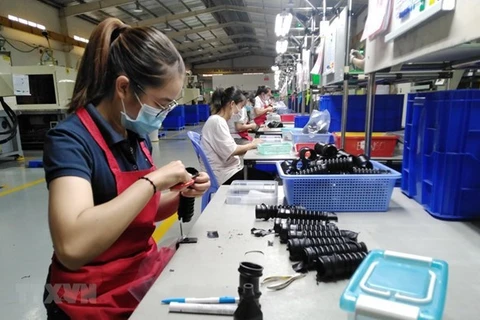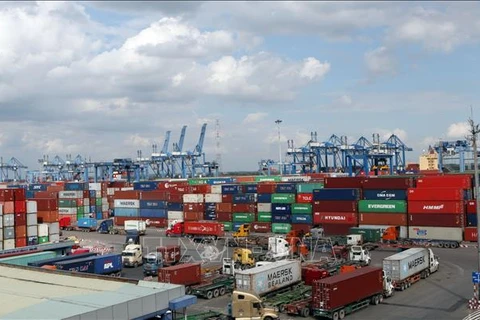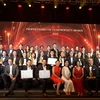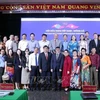Hanoi (VNA) – With the increasing foreign investment in Vietnam, the human resources structure will see a fundamental change, especially in the manufacturing sector, since FDI generally goes into industries that require medium to very skilled workers.
Trend of technological application
Dr. Trinh Thu Nga, Deputy Director of the Institute of Labour Science and Social Affairs, said up to 94 percent of the FDI enterprises in the manufacturing industry tend to step up the application of cutting-edge technologies and automation.
“This is a positive sign of economic development and demand for skilled labourers in the FDI sector in the time ahead,” she said. “During the 2021-2023 period, all of the FDI firms will recruit new skilled workforce to serve production and business expansion.”
“The COVID-19 pandemic will become more complicated in 2021 and the world is still in the ‘new normal’ phase,” said Bui Ton Hien, director of the Institute of Labour and Social Affairs.
“Businesses have to optimise their operation and production to be both more effective and safer.
“Foreign-invested firms in manufacturing will lean more towards automation, and will thus influence demand for labour skills and jobs requiring high skills in the market in the next two to three years.”
According to a comprehensive survey of over 200 foreign enterprises in manufacturing and processing by ManpowerGroup Vietnam and the institute between October to December last year, the firms use high to very high level technologies (32 percent) or medium level technologies (63 percent).
Only 5 percent use low or very low-level staff.
Nearly half ò their workers (46 percent) perform unskilled or simple jobs, with the rate being especially high in motorbike and automobile manufacturing, textile and electronics.
Around a third of the workers have medium to low skills (office workers/ services and sales, assembly technicians and equipment operators).
Work ethics, discipline at work and professional/technical skills are rated as very important by the companies.
Foreign language skills also play a critical role.
The skills that businesses find most difficult to find are professional/technical, foreign language, analytical, logical and critical thinking, creativity, initiative, leadership/management, decision making, problem solving, and conflict management.
65 percent of new jobs haven't appeared yet
Simon Matthews, regional manager of ManpowerGroup Vietnam, Thailand & Middle East, said 65 percent of the jobs that Gen Z (young people born in 1996 or later) will do have yet to be offered in the labour market.
“Vietnam has steadily turned into a manufacturing hotspot in Asia due to its relatively large and cost-competitive workforce, attractive tax regime, stable political environment, geographical advantages, and open trade policies.
“Foreign firms plan to expand manufacturing operations in Vietnam in an effort to diversify supply chains. This will bring about great opportunities for Vietnam to develop manufacturing to the next level, creating thousands of meaningful jobs for its workforce.
“Due to the technological disruption, employers need to develop an effective and holistic workforce strategy. As the world of work is changing fast and it becomes more and more challenging to find workers with suitable skills, organisations must build, bridge and borrow the skill sets they need.
“That will be critical for their success…, especially in the digital age.”
The manufacturing sector achieved a higher growth momentum in the fourth quarter of 2020 than previous quarters, brightening prospects for an economic recovery.
With its international integration and young and abundant workforce, Vietnam continued to strongly attract FDI.
The businesses participating in the survey are in motorbike or automobile manufacturing, electrical and electronics production, textiles, leather and footwear, food and beverages, chemicals, and interior decoration.
They are located in six provinces or cities with high rates of foreign investment: Bac Ninh, Hanoi, Hai Duong, Da Nang, Binh Duong, and HCM City./.
























